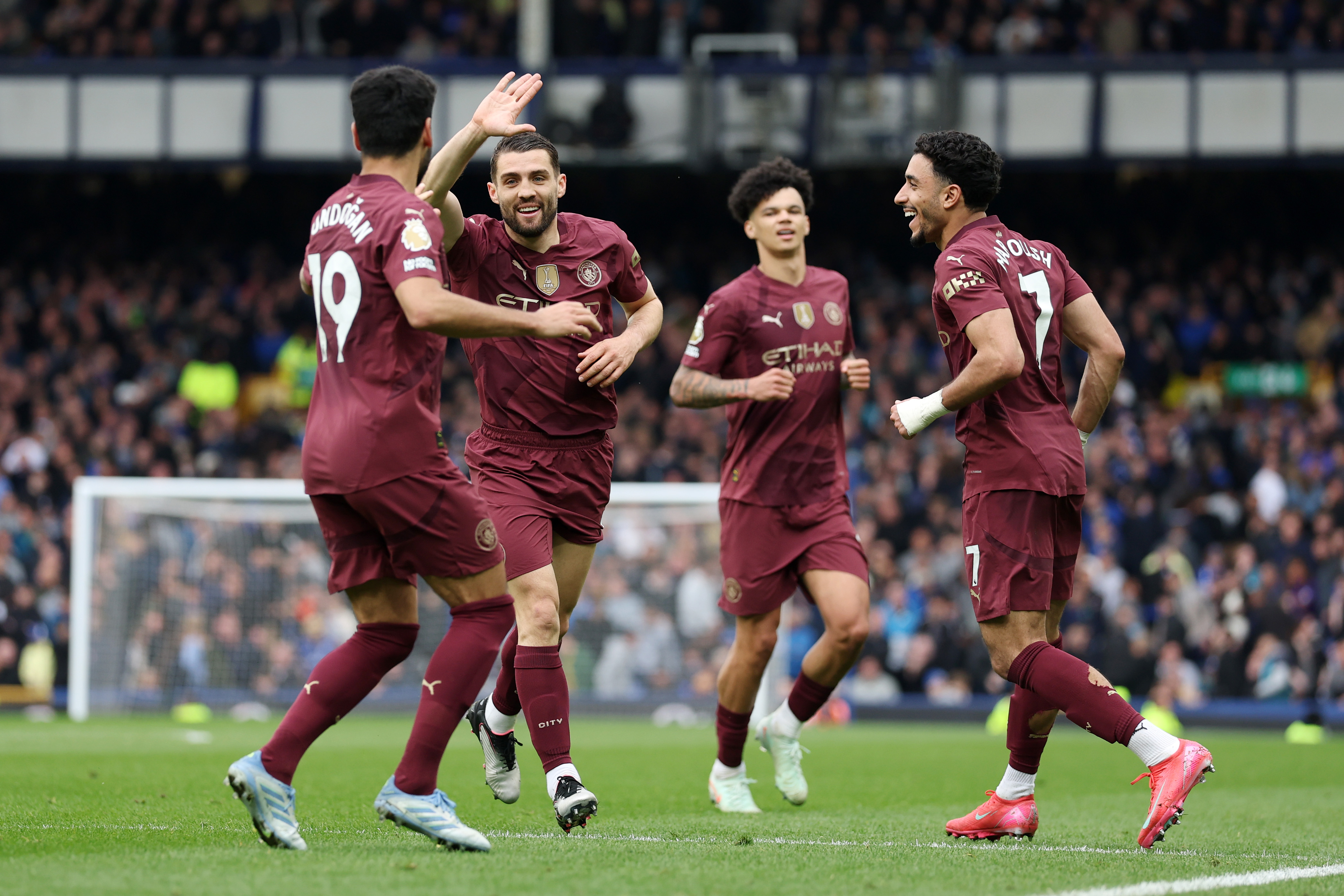Keshi the unpaid champion seeks take-off for Super Eagles
Nigeria coach Stephen Keshi: the champion coach on £18k per year
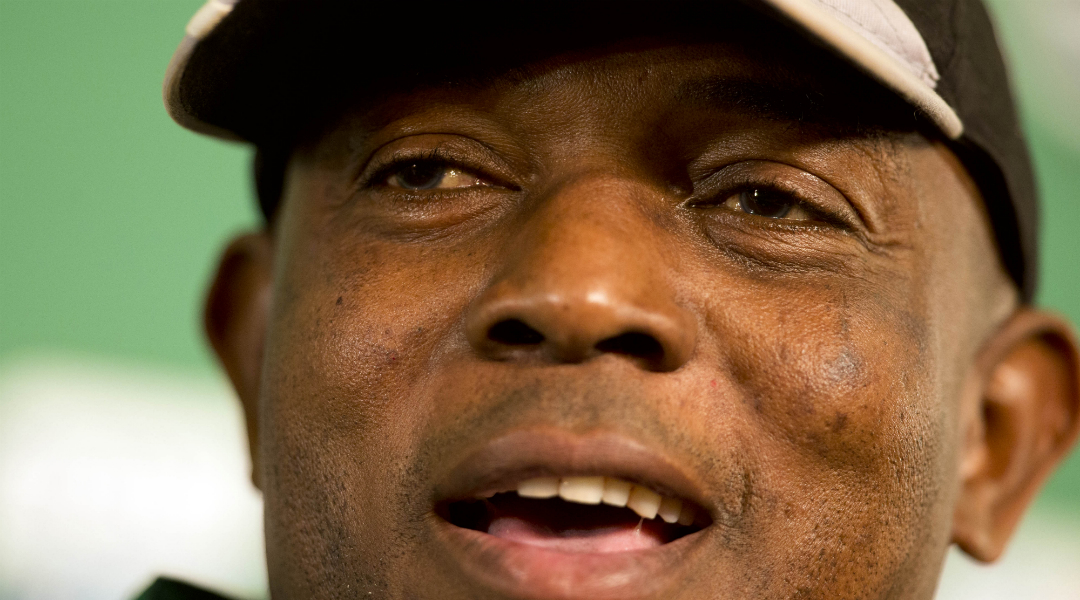
It’s 2.30am at the West Atlanta Hotel in Buckhead, a major uptown district of Atlanta, Georgia. The loud noise in the hotel lobby has died down, but you can still hear people talking.
A few hours earlier, Nigeria had played a pulsating 0-0 draw with Mexico in front of a capacity crowd at the Georgia Dome, setting the attendance record for football in the state.
The Super Eagles' coach Stephen Keshi is tired, exhausted and looks like he needs a break with his family at home in California. Weeks earlier in South Africa, he managed a Nigerian league team to a worthy third place in the African Nations Championship, a newer international competition solely for players based in their domestic leagues – not to be confused with the coveted Africa Cup of Nations, which Keshi's Nigeria won last February.
“I’ve not had a holiday," explains Keshi, "because since I came to the States I’ve been to Brazil for the [World Cup 2014 coaches'] workshop, then I came back and one week later I’m in Atlanta for this Mexico game.”
Get FourFourTwo Newsletter
The best features, fun and footballing quizzes, straight to your inbox every week.
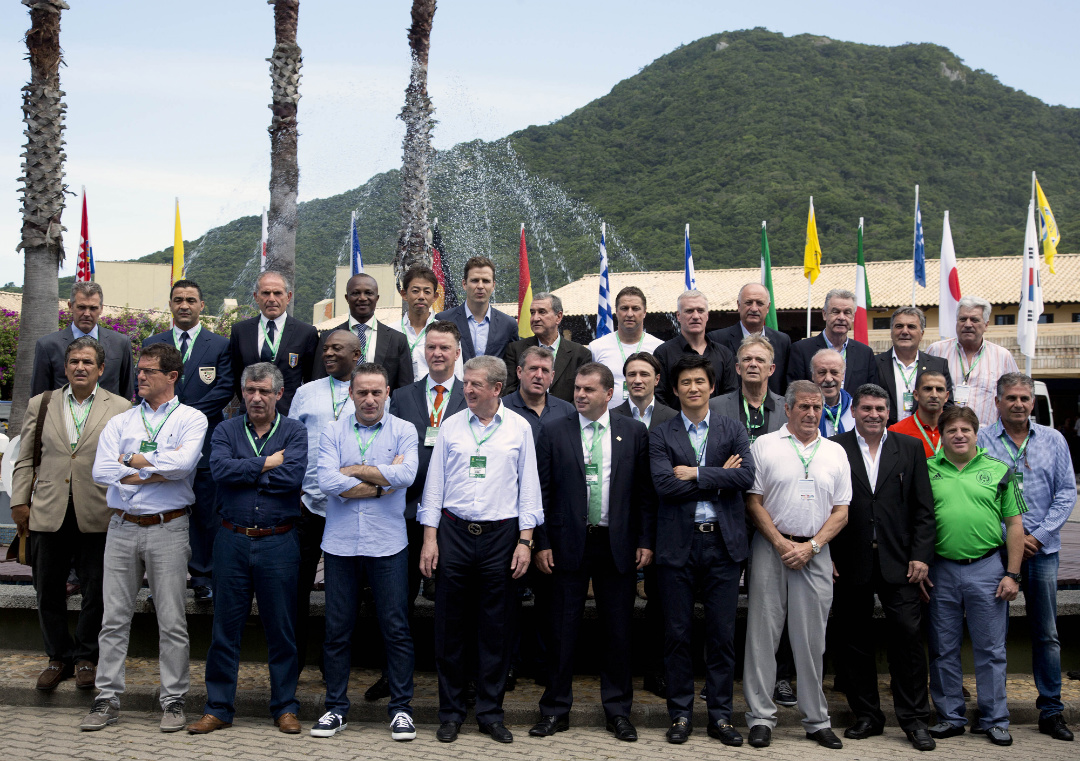
Keshi's two sons live in Atlanta, and earlier in the day he had seen Stephen Jr – a graduate of Morehouse College, along with fellow alumni like Dr Martin Luther King Jr, filmmaker Spike Lee, actor Samuel L Jackson and 400m hurdles legend Ed Moses.
Keshi actually named both boys Stephen. He jokes that he might be selfish and wanted everything to be his. But selfish isn't a word any African fan would describe this legend of the continent, only the second man to win the Cup of Nations as both a player and a manager.
Before he sits down for an interview, Keshi takes countless photographs and “selfies” with adoring fans of the Super Eagles; his fellow Nigerians, Africans and Mexicans. The Mexican fans had dashed across the street from their team’s hotel The Westin.
With the fans, Keshi is friendly and always smiling, but it’s more about mutual respect when dealing with delicate players who make more money than their gaffer. He once was a player so he understands.
If I respect you, won't you respect me back? There is a fine line between a coach and player”
“If I respect you, won't you respect me back?” Keshi asks as he explains his relationship with his charges. “There is a fine line between a coach and player.”
He knows from experience. Although now commonly known as The Big Boss, Keshi was a well-regarded player too; having started his football in the Nigerian League, he moved to Ivory Coast to play with Stade d'Abidjan and Africa Sports before making the transition to Europe.
Keshi was one of the first Nigerians to play professional football outside the country and continent, plying his trade at the highest level in Belgium in the 1980s with Lokeren before his move to then European giant RSC Anderlecht.
“These boys, they look up to me, they see me as a role model," he says. "I have to live up to that. I have to show them that.”
Unpaid salary
If his reputation suits an African legend, his salary as Nigeria coach doesn't. It's £18,810 – not weekly but monthly, less than star players like Chelsea's John Obi Mikel or Liverpool loanee Victor Moses command in a week.
To put it further into perspective, his annual salary is less than 10% of what CAF African Footballer of the Year Yaya Toure gets per week at Manchester City.
Yet even that paltry salary has remained unpaid since November 2013 by the Nigerian Football Federation. “We still have some outstanding salary that is not paid yet and this is the month of March,” Keshi confesses.
Nor is it the first time. The day after winning the Africa Cup of Nations last February, Keshi resigned, noting that the NFF hadn't paid his salary for months.
Furthermore, during the ACoN campaign, they had threatened to sack him once they found out their quarter-finals match was against Ivory Coast. Team spirit must have been at a low as players’ tickets were allegedly booked back to their destination before the match.
But with Keshi exuding leadership, Nigeria defeated the tournament favourites – Toure, Didier Drogba, Chieck Tiote et al – to win the match and eventually the trophy, which they hadn't lifted since 1994, when he was a player.
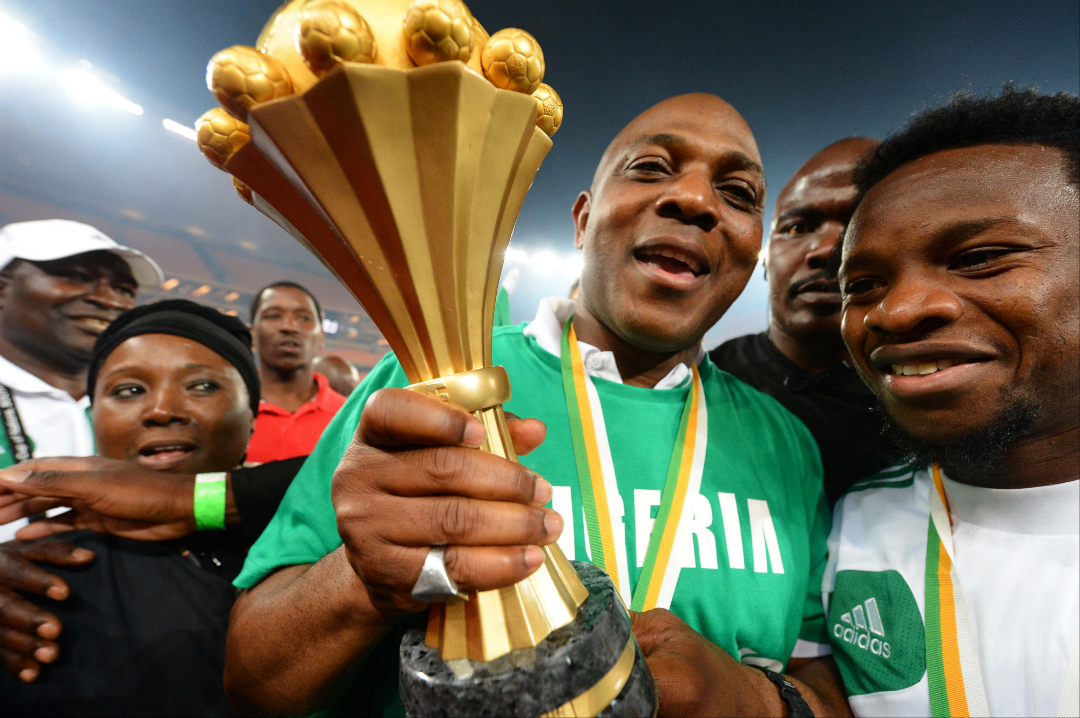
Under intense public scrutiny, the NFF paid up his salary and he stayed on. But nothing much changed: in the autumn it was revealed that he hadn't been paid since that Nations Cup reimbursement.
So what motivates him? Why remain on a job that rarely pays even a comparatively pitiful salary?
“That’s a very good question,” he says as Keshi pauses to appreciate the gravity of his dilemma. “I know we all need money. I need money, because I have five kids, three of them are in college and I need to pay their tuition.
I need money, because I have five kids, three of them are in college and I need to pay their tuition"
"But when you see ordinary Nigerians on the street appreciative of what you do, praying for you and they are so happy, that’s big."
Warming to his theme, he sits back in his chair and tells a story. Once at an airport, he was approached by a stranger: “Big Boss, please: this is all I have, but you must take it.” The stranger gave the gaffer $50.
“I said 'No, I’m fine'; he said 'No, you have to take it.' When you look at these people, sometimes it’s just overwhelming,” Keshi says with emotion.
When he encounters strangers like that, he is grateful that people appreciate the job he is doing, but he’s not alone. Other employees might have a different outlook on payment.
“It might not be the same with my assistants, they need their money, they need their salary to be paid so they can do what they have to do for the family. We’re different, but when you meet people like this you say 'Don’t worry about salary, let me keep doing this.'
“These people are happy. We’ll keep fighting, hopefully someday it’s going to change and we’ll get paid!” he laughs.
You might think that as African champions heading to Brazil 2014, the Super Eagles should be an easy sell to top companies around Africa and beyond. But the federation always insists that it is broke.
“Yes, it's true that we are African champions, but when they say they don’t have money what are you going to do? Hopefully something will be done. We’ll see what happens in the next month."
Keshi's vision for Nigerian football
In November 2012, after beating Venezuela 3-1 in Miami, Keshi was deep in thought. With the Cup of Nations weeks away, he was wondering what was next for Nigerian football. It was worth the consideration.
“My vision is to bring back our style of play, which is attacking football, with speed, power and technique, which I think has been lacking for so many years. It’s not going to take one day or six months to get that done. It will take time.”
Part of his vision is to take Nigeria back to where it used to be: one of the top teams in African football.
“It’s the normal thing to do in any nation, that’s why they have the national league. There are players out there. I think it’s a good thing to do. I came out as a product of the local league,” Keshi says.
Back in Keshi’s playing heyday, he was part of Nigeria's first World Cup finals squad, at USA 1994. In those days the Super Eagles could call on names like Daniel Amokachi, who went on to play for Everton, Norwich regular Efan Ekoku and future Bolton legend Jay-Jay Okocha, once described by a commentator as “so good they named him twice”.
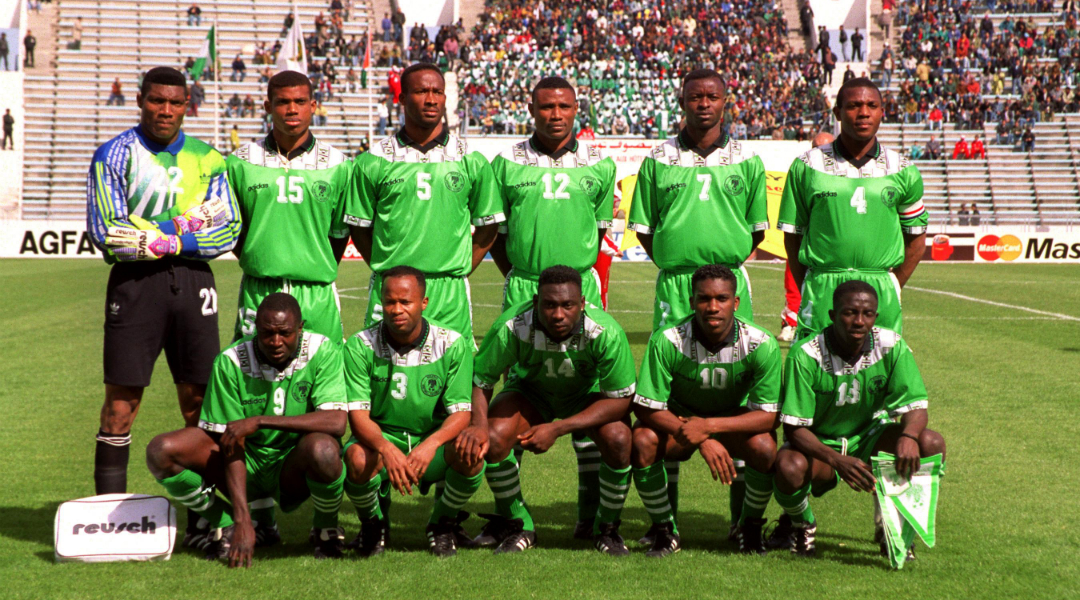
When Keshi first became national coach, former team-mate Samson Siasia was the fans' favourite, but he had failed to qualify for the 2012 Nations Cup and the people’s choice had to go.
Such are the pressures of managing the team which represents a nation of 175 million. Even with a title and World Cup ticket, some sections of Nigerian football are not satisfied. They want Keshi to tinker with the team and bring back some players not in the fold at the moment.
Changing the Super Eagles
For a 2013 Nations Cup qualifier against Rwanda, Keshi had invited Pete Odemwingie, Joseph Yobo, Yakubu and other familiar names, but the team played a dull 0-0 draw away in Kigali.
He decided he needed a change and brought in new players who wanted to play in his system. His position is Nigeria that cannot rely on players who do not fit the system and are not ready to fight for the shirt.
I don’t have favouritism; I don’t play with emotions. I tell you the way it is and if you don’t like it you leave"
“I don’t have favouritism; I don’t play with emotions when it comes to my team," says Keshi. "I tell you the way it is and if you don’t like it you leave.”
By now it’s really late, but Keshi still jokes and gives his opinions and he won’t stop the interview – it’s not his nature. You can’t hear the fans in the lobby any more; it’s so quiet you could hear a pin drop. Finally, the coach is off to his hotel room. In the morning he will meet with his son again before he heads west.
“Now I can go back and try to spend some few days with the family and be with the kids. I’m going back to California a little bit before heading to Nigeria,” he says.
Nigerians can afford to give him that break. They understand that picking a 23-man squad will be a tough task. All he wants is to bring smiles to their faces come June.
“My goal was to make Nigerians happy and to build a very strong national team for them.” It's a goal he will pursue without complaint, and perhaps even without payment. Nigeria is lucky to have him.
